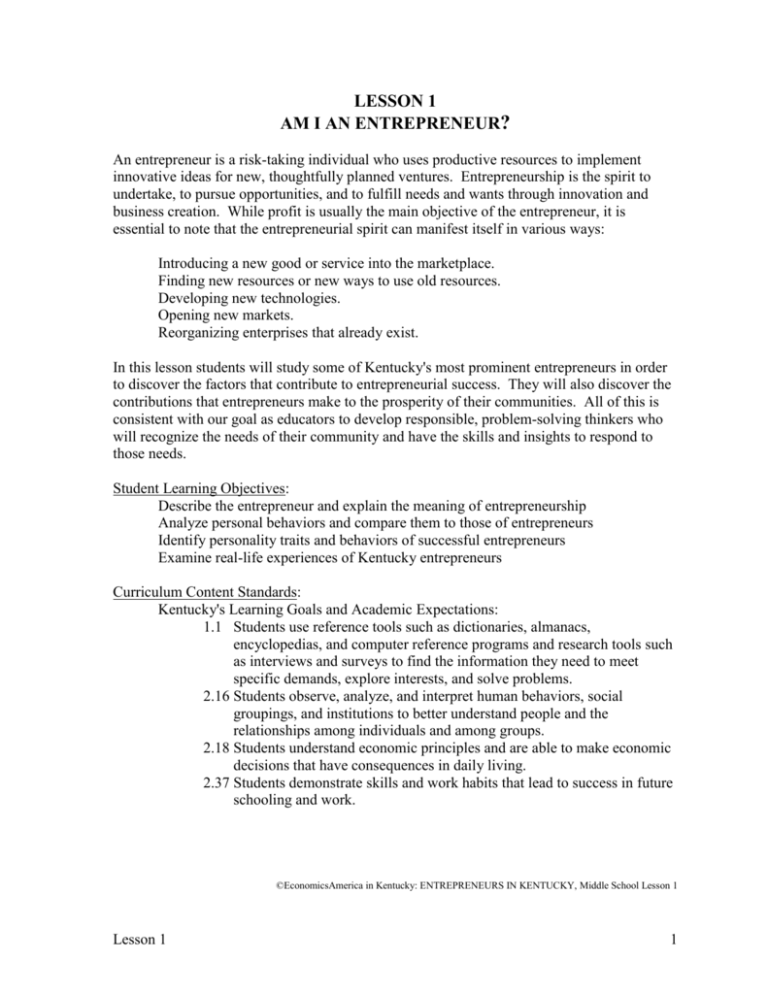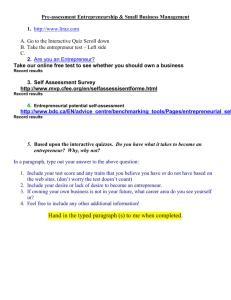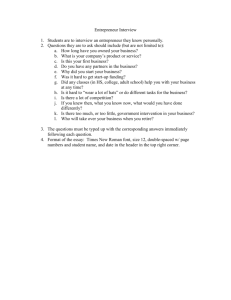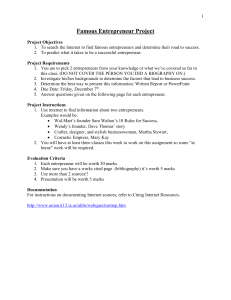Lesson 1 - Am I An Entrepreneur
advertisement

LESSON 1 AM I AN ENTREPRENEUR? An entrepreneur is a risk-taking individual who uses productive resources to implement innovative ideas for new, thoughtfully planned ventures. Entrepreneurship is the spirit to undertake, to pursue opportunities, and to fulfill needs and wants through innovation and business creation. While profit is usually the main objective of the entrepreneur, it is essential to note that the entrepreneurial spirit can manifest itself in various ways: Introducing a new good or service into the marketplace. Finding new resources or new ways to use old resources. Developing new technologies. Opening new markets. Reorganizing enterprises that already exist. In this lesson students will study some of Kentucky's most prominent entrepreneurs in order to discover the factors that contribute to entrepreneurial success. They will also discover the contributions that entrepreneurs make to the prosperity of their communities. All of this is consistent with our goal as educators to develop responsible, problem-solving thinkers who will recognize the needs of their community and have the skills and insights to respond to those needs. Student Learning Objectives: Describe the entrepreneur and explain the meaning of entrepreneurship Analyze personal behaviors and compare them to those of entrepreneurs Identify personality traits and behaviors of successful entrepreneurs Examine real-life experiences of Kentucky entrepreneurs Curriculum Content Standards: Kentucky's Learning Goals and Academic Expectations: 1.1 Students use reference tools such as dictionaries, almanacs, encyclopedias, and computer reference programs and research tools such as interviews and surveys to find the information they need to meet specific demands, explore interests, and solve problems. 2.16 Students observe, analyze, and interpret human behaviors, social groupings, and institutions to better understand people and the relationships among individuals and among groups. 2.18 Students understand economic principles and are able to make economic decisions that have consequences in daily living. 2.37 Students demonstrate skills and work habits that lead to success in future schooling and work. ©EconomicsAmerica in Kentucky: ENTREPRENEURS IN KENTUCKY, Middle School Lesson 1 Lesson 1 1 EconomicsAmerica's Voluntary National Content Standards in Economics: Standard 14 Students will understand that entrepreneurs are people who take the risks of organizing productive resources to make goods and services. Profit is an important incentive that leads entrepreneurs to accept the risk of business failure as well as success. Economic Concepts: demand, economy, economic growth, entrepreneur, goods, human capital, profit, services, wants PREPARE: Use the blackline masters at the end of this lesson to make one copy of the following activity sheets for every student in class: Activity Sheet 1-1: Characteristics of the ENTREPRENEUR Activity Sheet 1-2: Human Capital (Skills) Inventory Activity Sheet 1-3: Am I the Entrepreneurial Type? Activity Sheet 1-4: Entrepreneur Interview Questions TEACH: Ask students to identify relatives who have their own businesses. Try to identify additional local individuals who work as disc jockeys, give lessons, tune instruments, or are otherwise engaged in the music industry. Tell students that people have a demand (desire for and ability to purchase) for Kentucky's musical products, and that Kentucky entertainers supply goods (tangible items such as cassettes, CDs, and instruments) and services (work that is performed for others such as concerts, lessons, recording studio sessions) to satisfy consumer's wants (desires that can be satisfied by consuming a good or service). Whenever there is a demand for musical talent, entrepreneurs have the opportunity to make a profit (the money left over after all expenses have been met). Tell students that other talented Kentuckians use their human capital (their skills, knowledge, and special abilities acquired through education, training, and experience) to bring the lives of Kentuckians to readers through poetry, books, and articles. Ask students to think of the many special entrepreneurial talents who have contributed to the Kentucky economy (the organized way that a society provides for the wants and needs of its citizens). One of the keys to economic growth and development is the entrepreneur, the risk-taking individual who seizes an opportunity to put his/her ideas to work with" the goal of making a profit.” Entrepreneurs possess several common characteristics which often lead to business successes or at least to their willingness to keep trying to make their businesses work. These same characteristics are often beneficial to a worker's success. Employers seek employees who solve problems, take initiative, and are willing to work and put forth extra effort. Possession of certain characteristics often leads people to a particular career and helps them succeed in that career. ©EconomicsAmerica in Kentucky: ENTREPRENEURS IN KENTUCKY, High School Lesson 1 Lesson 1 2 Lesson 1 3 Activity 1-1: Entrepreneurial Characteristics Organize the students in small groups and distribute Activity Sheet 1-1: Characteristics of the ENTREPRENEUR. Groups are to write a word or phrase after each letter of ENTREPRENEUR that describes a characteristic, trait, or human capital skill of an entrepreneur. Possible examples might include the following: E nthusiastic N ew ideas T ry, try again R isk taker E ager P ersistent, patient, power, pride, profit R eady E nergetic N ew methods, novel E arly riser U nusually confident, uncompromising, upbeat R ational Activity 2: Human Capital Inventory 1. Place students in small groups and distribute Activity Sheet 1-2: Human Capital (Skills) Inventory. Instruct students to list as many human capital skills that are possessed by members of their group. (Example: some students can type, others can program computers, cook, repair automobiles, etc.) Remind students that knowledge acquired in classes, as well as job skills and other special talents are all part of human capital, and that human capital is often critical to business success. ©EconomicsAmerica in Kentucky: ENTREPRENEURS IN KENTUCKY, High School Lesson 1 Lesson 1 4 Activity 2: Human Capital Inventory (continued) 2. After each group has conducted an inventory of their skills, ask the groups to think about a hypothetical business they could form that would make use of those skills. This would result in a form of specialization based on their human skills. 3. Ask students about additional skills they would need to be successful in their hypothetical line of business. Have students suggest ways in which these skills could be obtained. (Possible examples: taking night classes, enrolling in college degree programs, attending trade schools, acquiring other forms of professional training, getting on-the-job training at a local employer). 4. Ask the students to explain how an increase in their skill level would benefit (1) the local economy, and (2) themselves. (Possible responses: the local economy would be more productive and could attract more industries if the labor force was better qualified; an increase in skill levels would allow them to earn more income). Activity 3: Am I the Entrepreneurial Type? 1. Distribute copies of Activity Sheet 1-3: Am I The Entrepreneurial Type? to every student in class. Use the activity sheet to review and discuss the characteristics that entrepreneurs are most likely to possess. Remind students that an entrepreneur is a risk taker in search of profits and the entrepreneurial characteristics include the willingness to work hard, take initiative, and make decisions. 2. Direct the students to work individually. Ask them to consider which traits they possess and rate themselves using a 1-10 scale (10 being highest). Have them add their individual ratings to obtain a total score. 3. Encourage students to share their scores with others in class. Tell students that education and experience will cause their human capital to grow--thereby opening new doors of opportunity. 4. Extending the lesson. Tell students that employers often look for many of these entrepreneurial characteristics when hiring. Ask students to think of ways that employers encourage and even reward such behavior in their employees (possible examples could include having an employee suggestion box to encourage new ideas, or paying bonuses to reward a strong work ethic.) EconomicsAmerica in Kentucky: ENTREPRENEURS IN KENTUCKY, High School Lesson 1 Lesson 1 5 Activity 4: The Entrepreneur Interview 1. Distribute copies of Activity Sheet 1-4 Entrepreneur Interview Questions to every student in class. Instruct students to interview an entrepreneur in their area. 2. Have students prepare a brief one or two page summary of their findings for presentation in class. EconomicsAmerica in Kentucky: ENTREPRENEURS IN KENTUCKY, High School Lesson 1 Lesson 1 6 Activity Sheet 1-1 Characteristics of the ENTREPRENEUR Directions: In small groups, discuss entrepreneur characteristics/traits as well as those human capital skills which are beneficial to the entrepreneur. Write a word or phrase after each letter of ENTREPRENEUR that describes a characteristic, trait, or human capital skill of an entrepreneur. Sample response: E = energy, eager, effective (etc.) E N T R E P R E N E U R ©EconomicsAmerica in Kentucky: ENTREPRENEURS IN KENTUCKY, High School Lesson 1 Lesson 1 7 Activity Sheet 1-2 Human Capital (Skills) Inventory Directions: First, create a list of the human capital skills in your group. This would include academic strengths, musical talents, artistic abilities, computer skills, and work experience. Next, consider a type of business your group could start given their current inventory of skills. Third, identify additional skills that your group would need, and discuss ways that these skills might be obtained. Fourth, list several benefits that would occur to anyone who acquired additional skills. 1. Inventory of current group skills: 1. ___________________________________________________________________ 2. ___________________________________________________________________ 3. ___________________________________________________________________ 4. ___________________________________________________________________ 5. ___________________________________________________________________ 6. ___________________________________________________________________ 7. ___________________________________________________________________ 2. Potential business ventures that could be formed on the basis of the skills: 1. ___________________________________________________________________ 2. ___________________________________________________________________ 3. ___________________________________________________________________ 4. ___________________________________________________________________ 3. Additional skills needed, and ways to acquire these additional skills Additional Skills Needed Ways to Acquire Additional Skills 1. ___________________________ _______________________________ 2. ___________________________ _______________________________ 3. ___________________________ _______________________________ 4. ___________________________ _______________________________ 5. ___________________________ _______________________________ 4. Benefits to the economy and to yourself as a result of acquiring new skills: 1. ___________________________________________________________________ 2. ___________________________________________________________________ 3. ___________________________________________________________________ ©EconomicsAmerica in Kentucky: ENTREPRENEURS IN KENTUCKY, High School Lesson 1 Lesson 1 8 Lesson 1 9 Activity Sheet 1-3 Am I the Entrepreneurial Type? Directions: The following is a list of entrepreneurial characteristics/traits. Examine the list and then rate yourself on the characteristics/traits that you possess on a 1-10 scale (10 being high). Entrepreneurial Trait/Characteristic Rate yourself 1-10 on how strongly you possess the characteristic 1. Competitive (willing to work harder than someone else) ___ 2. Creative (ability to be innovative, create a new idea/method) ___ 3. Energetic (willingness to work long hours) ___ 4. Independent (wants to be own boss) and profit (make $) ___ 5. Persistent (if at first you don't succeed, try, try again) ___ 6. Problem solver (takes initiative, creates solutions, thinks, acts) ___ 7. Risk taker (willing to lose money or quit job to start own business) ___ 8. Self-confident (belief in yourself and your ideas) ___ 9. Versatile (ability to do many tasks) ___ Total Score: (add your ratings to get your score) ___ Extension: Employees can also demonstrate entrepreneurial characteristics that are helpful to business operations, and employers often look for many of the characteristics listed above when hiring. Desirable employee characteristics include: taking initiative, making decisions, and demonstrating a strong work ethic. Employers can encourage these types of entrepreneurial behaviors in a number of ways. List several below: 1. ___________________________________________________________________ 2. ___________________________________________________________________ 3. ___________________________________________________________________ 4. ___________________________________________________________________ 5. ___________________________________________________________________ ©EconomicsAmerica in Kentucky: ENTREPRENEURS IN KENTUCKY, High School Lesson 1 Lesson 1 10 Activity Sheet 1-4 Entrepreneur Interview Questions Directions: Interview an entrepreneur using the questions below as a guide. Summarize your findings in a short presentation to the class. 1. When and how did you get the idea for your business? 2. What were your early goals and what steps did you take to realize them? 3. How did your family, friends, or events in your younger life influence your venture? 4. What interests and hobbies did you have that influenced your business idea? 5. Who provided the support (monetary or otherwise) that you needed? 6. What obstacles did you encounter at the beginning of your venture? 7. How did you overcome these obstacles? 8. What early successes kept you going? 9. How has your life changed since you started your business? 10. How is your business organized? 11. What made you feel that you were a success? 12. What is your major source of competition and how do you stay ahead of it? 13. How many employees do you have and what do you look for in an employee? 14. What do you like about being in business for yourself? 15. What has been the toughest part of being in business for yourself? 16. What are your hopes for the future of your business? 17. If you had to do it over again, would you? 18. What attitudes and characteristics does one need to possess to be a successful entrepreneur? 19. Any advice for would-be entrepreneurs? 20. Anything else you would care to add? EconomicsAmerica in Kentucky: ENTREPRENEURS IN KENTUCKY, Middle School Lesson 1 Lesson 1 11





